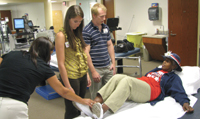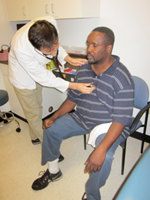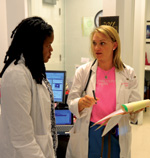|
By
Dawn Brazell
Public Relations
Sporting a patriotic hat,
patient Bettie Gaines shows off her lively spirit. Unfortunately, her
body's just not keeping pace. Talking to physical therapy students
about how she can gain more mobility and hip strength, Gaines is one of
the first to take advantage of an expansion of MUSC's award-winning
CARES (Community Aid, Research, Education and Support) clinic.
 Patient
Bettie Gaines talks to physical therapy students Corey Patton and Sarah
Nameth. Advisor Dr. Sara Kraft, left, oversees the treatment in
the new after-hours clinic on Ashley Avenue. Patient
Bettie Gaines talks to physical therapy students Corey Patton and Sarah
Nameth. Advisor Dr. Sara Kraft, left, oversees the treatment in
the new after-hours clinic on Ashley Avenue.
The physical and
occupational therapy after-hours clinic, which takes referrals from
unfunded and underfunded patients, is the latest addition to the CARES
clinic, a non-profit organization managed by medical and health
profession students providing free medical care to the underserved,
uninsured population. The CARES clinic, which recently won the 2011
South Carolina Governor's Volunteer Award, operates in conjunction with
East Cooper Community Outreach (ECCO) in Mount Pleasant. Physical and
occupational therapists had been going to that location, but wanted to
switch to the larger MUSC facility downtown where they have more
equipment for patient care.
 Dr. Wanda
Gonsalves, center, with Drs. Katherine Spikes and Justin Ellett in
Columbia to receive an award for CARES. Dr. Wanda
Gonsalves, center, with Drs. Katherine Spikes and Justin Ellett in
Columbia to receive an award for CARES.
Amanda Peck, a third-year
physical therapy student, said the clinic allows students to get
hands-on experience and build mentor relationships, while patients get
access to the latest in therapy that would otherwise be unavailable.
She took the CARES elective class her first year, and has been
volunteering ever since. The beauty of the new clinic is that it is
based on the formula that has made the clinic such a success — it runs
mostly on the energy and enthusiasm of MUSC students and their faculty
mentors.
Patty Coker-Bolt, Ph.D.,
assistant professor in the Division of Occupational Therapy, said that
the staff is excited to open this new specialty branch of the clinic.
Clinics will be held from 6:30 to 9 p.m. on Tuesdays evenings in the
Ashley Rutledge garage at 158 Ashley Ave.
"It has to happen. Our
students need it," she said of the hands-on learning the clinic offers,
"and our community needs it. Maybe there are some exercises that could
help patients reduce their pain that they wouldn't be able to access
otherwise."
With this expansion of the
clinic, occupational and physical therapy services will be increased
with hopes of also receiving referrals for therapy services
from other free clinics such as Barrier Islands Free Medical
Clinic and Crisis Ministries.
"There's a vision to
expand this all around. We think the potential is big. The population
of unfunded and uninsured patients is certainly growing in our region
and state due to cut backs in Medicare and Medicaid services, a
decrease in those who qualify for these programs and persistent
unemployment that can lead to loss of insurance coverage."
Coker-Bolt said therapy in
many cases increases a person's chances of getting or keeping a job.
The clinic lets students see how their work in occupational therapy
helps a real person, who may be having difficulty driving, dressing or
grocery shopping. "For me the excitement is training them to use what
they're learning in the classroom."
One challenge of the
expansion is that the therapists want to maintain ties with their
colleagues at the East Cooper site of CARES. Coker-Bolt said they
realize the value of interprofessional training and will be intentional
about maintaining ties with East Cooper CARES through consults and
telemedicine practices.
Medical
student Peter Bailey examines Kenneth Dickerson in the CARES clinic in
Mount Pleasant.
Wanda Gonsalves, M.D., one
of the main founders of CARES, said volunteering with CARES provides
students an opportunity to work interprofessionally in real-life
situations. Thrilled about the recent award, she's been amazed by how
much the program has grown. She was involved with a similar program at
the University of Kentucky and wanted to help students develop a
similar clinic at MUSC. She started an elective in 2004 at MUSC for
first and second year medical students to devise their own program.
After eight months of hard
work in areas from marketing to business management, the clinic opened
its doors in 2005 in Mount Pleasant. "It grew much faster than we did
at Kentucky. I knew how to do it and what worked and what didn't."
She also knew the students had to have ownership. Even when they
suggested something that she thought wouldn't work, she would let them
do it, she said. Service learning is a key mission of CARES. The
clinic, with hours Monday, Tuesday and Thursday evenings from 6:30 to 9
p.m., is open every week except Christmas, serving about 1,000 patients
a year.
Gonsalves said she can't
imagine a training program without such an experiential training model
and believes all students should participate. "Things don't stick
unless you're doing it. We should be doing a better job of educating
the students because you learn by doing. It changes their lives. It
keeps them involved in serving the underserved. I just love the fact
that the students learn so much when they are there."
The Liaison Committee on
Medical Education (LCME), a leading accrediting authority for medical
education programs, now requires service learning as one of its
standards. Gonsalves sees the role of CARES just continuing to grow.
The program now offers student electives all four years and is
incorporating more involvement from diverse medical specialties and
health professionals. Upper-level students are paired with their
less-experienced classmates so that students learn how to mentor and
collaborate.
CARES improves patient
care, given that students in the electives do qualtiy improvement
projects that identify ways to better serve patients. There also is a
student board that oversees the clinic's operations.
For the students, there
are wide-ranging benefits, from being a valuable resume builder to the
real-life exposure of community service.
 Dr. Natalie Gregory works with
medical student Elena Gore at CARES in Mount Pleasant. Dr. Natalie Gregory works with
medical student Elena Gore at CARES in Mount Pleasant.
Faculty benefit as well.
Gonsalves, who balances her roles as physician, associate dean of
resident inclusion and diversity education and medical director for the
Physician Assistant Program, said she never gets tired of being a CARES
adviser and volunteer. However, the clinic needs more faculty
volunteers to give more breaks to the regular core group.
Faculty members who
volunteer support early pre-clinical experiences, something needed at
MUSC, she said. They also model the importance of community care.
"I like the idea of giving
back. If we weren't there and weren't helping, many of these people
would end up in the emergency room."
7 Great Things to
Know about MUSC's CARES
1. It changes lives.
Wanda Gonsalves, M.D.,
said it's not just the underserved, uninsured patients who benefit from
the non-profit clinic, but also the students. She gets calls from
graduates years later to say what an impact it had on their lives.
2. Service learning works.
CARES is one of the
best learning environments for students. It gets students into contact
with patients faster. "They have to write reflections of their time in
clinic, and it's amazing to see what they say they've learned."
3. It prevents ER visits.
Prevention is one
mission of CARES. Gonsalves said they work to help patients control
serious, chronic conditions which results in fewer ER visits.
4. All specialities are needed.
One misconception is
that faculty volunteers need to be specialists in primary care. They
pair specialists with primary care doctors, so new volunteers don't
need to be worried that they'll be out of their depth.
5. It lets students get real.
Though students learn
from the "standardized" patient interviews, there's no substitute for
the real thing. "Students learn how to really take care of their
patients. And the patients are OK with them learning that."
6. The people are normal.
"Some people would be
surprised to learn these are people — not homeless. They just don't
have insurance."
7. Busy people volunteer.
Her faculty volunteers
are some of the busiest people on campus, the perfect role models for
students to see in action. Faculty members would be surprised by how
much they would be blessed by the experience, she said.
For more information,
visit http://www.thecaresclinic.org
or call 876-7097.
|



 Patient
Bettie Gaines talks to physical therapy students Corey Patton and Sarah
Nameth. Advisor Dr. Sara Kraft, left, oversees the treatment in
the new after-hours clinic on Ashley Avenue
Patient
Bettie Gaines talks to physical therapy students Corey Patton and Sarah
Nameth. Advisor Dr. Sara Kraft, left, oversees the treatment in
the new after-hours clinic on Ashley Avenue Dr. Wanda
Gonsalves, center, with Drs. Katherine Spikes and Justin Ellett in
Columbia to receive an award for CARES.
Dr. Wanda
Gonsalves, center, with Drs. Katherine Spikes and Justin Ellett in
Columbia to receive an award for CARES.
 Dr. Natalie Gregory works with
medical student Elena Gore at CARES in Mount Pleasant.
Dr. Natalie Gregory works with
medical student Elena Gore at CARES in Mount Pleasant.